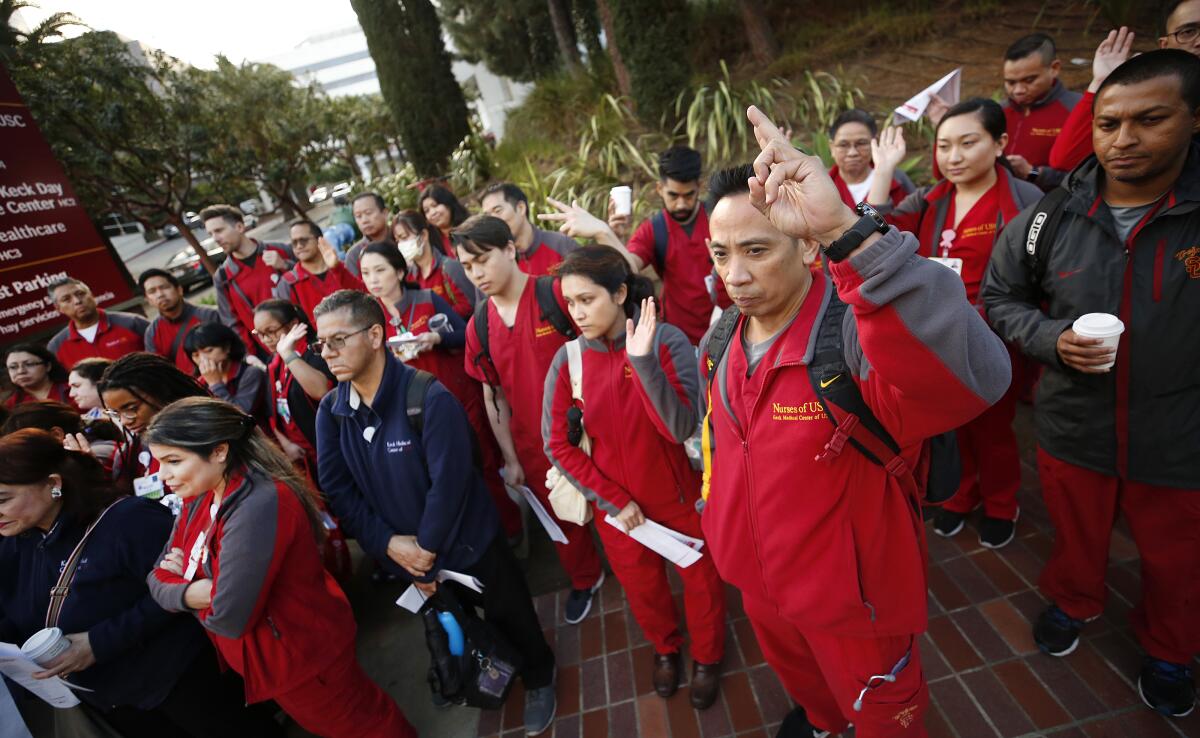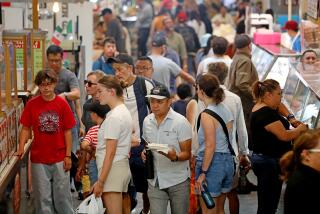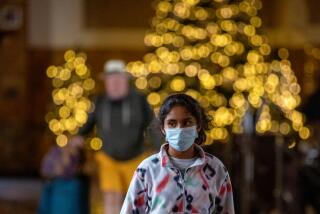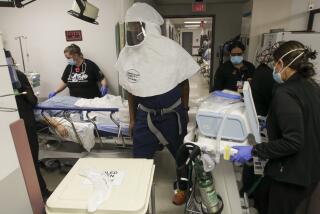Healthcare workers fear greater coronavirus risk due to safety gear shortage

- Share via
Federal officials have begun urging healthcare workers to switch from respirator face masks to looser surgical ones, a move that is raising alarms among doctors and nurses who say they will now be less protected when treating highly infectious coronavirus patients.
The abrupt guideline change announced on Tuesday by the federal Centers for Disease Control and Prevention is meant to alleviate a looming shortage of safety gear. But some healthcare workers fear they will be put at greater risk of contracting the virus, which in turn increases their chances of spreading the disease among patients and other workers.
The emerging problems over the quality and quantity of protective gear is the latest challenge facing the country as the number of infected people is expected to grow rapidly in coming weeks.
“Our most exposed workers in the world right now to this virus are frontline healthcare workers,” said Dr. Mike Ryan chief of the health emergencies program at the World Health Organization. Globally, ongoing shortages could bring the “moral hazard” of health workers who have to treat COVID-19 patients without the proper protective gear, he said.
“Would you like to be that health worker? Would you like to be a doctor or a nurse having to treat a patient, knowing full well that you are not protected? That’s an awful dilemma that no health worker, no health worker, in the world should have to face,” he said.
Before this week, U.S. health officials had recommended that doctors and nurses treating suspected or confirmed coronavirus patients wear N95 masks, called respirators, which are designed to filter out about 95% of small airborne particles. But officials are now limiting their use to stretch a national stockpile that contains only about 1% of the masks that experts predict could be needed.
The CDC’s new guidance recommends protective gear made of looser-fitting surgical masks and calls the change “an acceptable alternative when the supply chain of respirators cannot meet the demand.”
Respiratory masks are considered superior because they provide a custom fit and and block the virus when it is aerosolized, such as during an intubation. Surgical masks don’t form a seal around the face and aren’t as effective at blocking tiny droplets.
Early reports show the novel coronavirus is most commonly transmitted from person to person via coughing and sneezing, according to the CDC, which suggests a surgical mask should be sufficient to protect staff. Federal officials are still recommending that staff wear the tighter masks during procedures that may induce coughing and make the virus airborne.
Yet demands for more protective gear have increased as U.S. medical providers have watched in horror as Italian doctors and nurses struggle to treat the huge numbers of sick patients there. According to one study, 20% of Italian healthcare professionals working on the front lines of the outbreak have become infected with COVID-19.
In the U.S., where hospitals are bracing for a similar surge, hundreds of health workers have already been sent home because of possible coronavirus exposure.
“I’ve come to the realization that I’m going to catch this thing,” said an employee at one Los Angeles walk-in clinic, where N95 respirators are completely gone. He said the clinic’s administrators are adamant that paper surgical masks, still in stock, will be enough to protect the staff from COVID-19.
“The denial is really frustrating,” he said.
Federal officials said health facilities should return to using the N95 respirators for suspected COVID-19 patients once the supply chains are restored, but the timeline remains unclear. The shortage traces back to the Strategic National Stockpile, an $8-billion inventory of medical supplies saved up for a severe crisis and stored in confidential warehouses across the country.
In L.A. County, doctors in hospitals have said their departments are over-ordering masks and hoarding them. Some supervisors began taking mask inventories off their floors three weeks ago and have hidden them behind lock and key.
In emergency rooms, “patients were grabbing them by the boxful,” one said. “I’m searching the whole hospital for my size, but they’re all locked up now. They’re like gold.”
As schools close and businesses tell their employees to stay home, healthcare staff still show up to work, and will perhaps even take on extra shifts as case numbers begin to rise. Many say they worry they will be in danger without adequate protections; some already may be if, as is likely, there are already hundreds of undiagnosed COVID-19 patients in the U.S..
John Richardson, a pathology assistant at Parkview Community Hospital Medical Center in Riverside, was one of at least 10 employees furloughed after interacting with a suspected patient.
“Workers were allowed to come in contact for too many hours without wearing proper safety equipment, and as a result a large number of workers had to be sent home, putting us and our families at risk,” Richardson said in a statement.
It is unclear what the impact of the new mask policy will be. A 2019 clinical trial found that health workers who wore surgical masks on the job were no more likely to catch the flu than those who wore N95s.
Still, an L.A. county doctor said the use of surgical masks is a first. “They’re telling us, ‘You’re fine, you’re safe, just use the surgical mask.’ But we never would have done that in the past,” said the doctor who was not authorized to speak to the media. “We all know it’s because we don’t have enough N95 masks, but we can’t come out and say that, because the nursing unions might strike and refuse to come to work.”
That’s a reasonable concern, officials said. U.S. nurses threatened to strike in 2009 during the swine flu pandemic and walked off the job in 2014 to protest a lack of preparedness in dealing with Ebola.
This week, National Nurses United organized rallies at hospitals across the country protesting the CDC’s weakened guidance around protective gear for COVID-19. In addition to changing the face mask guidelines, the CDC said that negative-pressure rooms, which don’t allow air to escape to the rest of the hospital, are no longer necessary for all COVID-19 patients and should be prioritized for high-risk procedures.
UC Davis nurse Jenny Managhebi said she and colleagues want to be as safe as possible, even “overprotected,” given how little is known about the novel coronavirus. She pointed to research showing the virus can last for days on surfaces, such as her shoes, which would remain exposed if she were to treat patients while wearing the protective gear dictated by current guidelines.
“We want to take care of our patients. We want to keep everyone safe. And the best way to do that is to offer the premier protection” in order to keep the nursing workforce healthy, Managhebi said. “To the nurses, I think it doesn’t seem unreasonable.”
During an outbreak, medical professionals can be in more danger than others. Being exposed to multiple people who are very sick — the way someone working in a hospital would be — typically makes someone sicker than if they were exposed to only one person who was mildly ill.
Plus, hospital procedures, such as intubating a patient, may release large amounts of the virus that can easily infect workers in the room. When SARS, another coronavirus, was spreading around the world in 2003, a single patient at a hospital in Hong Kong is believed to have infected 138 people with the disease.
In a Kaiser emergency room in L.A. County, physicians worry that, even while contracting the virus could be mild for themselves, it could be lethal for the more vulnerable immunodeficient patients they treat next. “We may be unwittingly transmitting the virus,” one doctor said.
When World Health Organization officials looked into the Chinese healthcare workers who were infected with COVID-19, many did not have experience with infectious disease and were not following the proper protocol, they said. Proper protection and improved training in how to use it brought the rates down, said WHO epidemiologist Dr. Maria Van Kerkhove.
“That decline in healthcare workers [falling ill] over time has really shown that health care workers can be protected,” Van Kerkhove said.
Over the next 18 months, the Department of Health and Human Services plans to add 500 million N95 respirators to the stockpile. And California officials announced plans earlier this month to draw additional N95 respirators from the 21 million stored in the state’s emergency reserves, though some of those masks are beyond their official shelf life.
In the meantime, the public health system has been thrown into a frenzy. Steven Z. Zeldes, chief executive of AvaCare Medical, which sells medical supplies online, has been fielding calls around the clock from hospitals and health care systems desperate for gloves, masks, hand sanitizers and rubbing alcohol. People are ordering quantities of these supplies numbering in the millions, as healthcare facilities’ stockpiles run lower and lower, he said.
“It’s just a complete panic,” he said. “The second we put it up on our website, it’ll literally be a few minutes before we sell out, thousands, thousands of items.”
More to Read
Sign up for Essential California
The most important California stories and recommendations in your inbox every morning.
You may occasionally receive promotional content from the Los Angeles Times.















